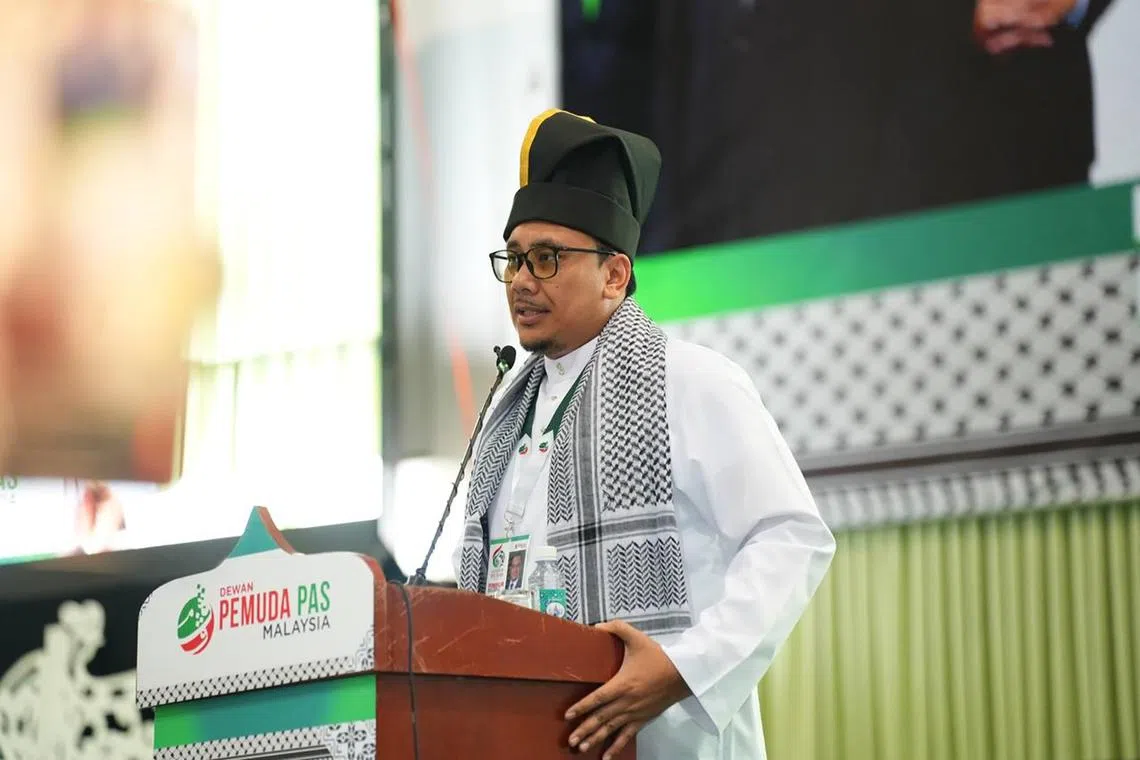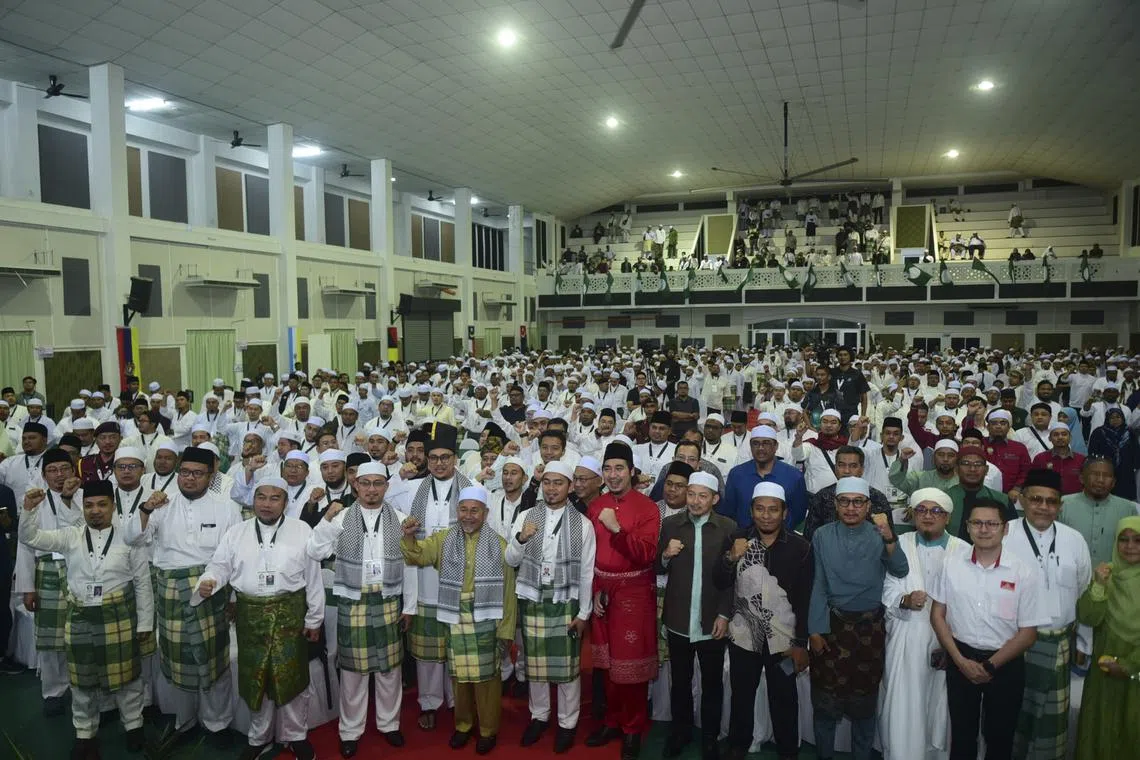After securing four state assemblies, Malaysia’s opposition PN targets Pahang in next election
Sign up now: Get insights on the biggest stories in Malaysia

Youth wing chief Afnan Hamimi Taib Azamudden admitted that the mission to convince non-Muslims to support PAS was challenging.
PHOTO: PAS YOUTH WING COMMUNICATIONS DEPARTMENT
TEMERLOH, Pahang – Having secured control of four state assemblies, the opposition Perikatan Nasional (PN) alliance is setting its sights on Pahang, Peninsular Malaysia’s largest state by land size, as its next target.
The PN ambition was made clear at the annual muktamar (congress) of the alliance’s lead faction, Parti Islam SeMalaysia (PAS), which is being held in three towns in Pahang, an Umno stronghold state.
“Our muktamar in Pahang this year signals that this state is ready to join the other four states that we are currently governing,” said PAS deputy president Tuan Ibrahim Tuan Man in the opening speech of the party’s youth wing meeting on Sept 11.
“We will lead the (state) government after the 16th general election,” he added, to thunderous applause from the hundreds of delegates in a civic hall in Temerloh town, about 1½ hours by car from Malaysia’s capital, Kuala Lumpur.
Representatives from PAS’ key ally in PN, Parti Pribumi Bersatu Malaysia, were present. Malaysia’s next general election, its 16th since independence, is due by end-2027.
PN won the legislative assemblies of Kedah, Terengganu and Kelantan in state elections in August 2023 for six of Malaysia’s 13 states, while Perlis was taken earlier in the 2022 General Election.
It was the first time that Perlis state had been wrested from Umno, a result mainly of the party’s infighting.
The electoral victory in the four Malay-belt states was also propelled by the so-called Green Wave. The pro-PN voters are led by youth disenchanted with Prime Minister Anwar Ibrahim’s governing coalition, and enthused by promises of lower costs of living and a Malay Muslim-centric government. Datuk Seri Anwar leads a multiracial coalition.
PAS and Bersatu have made strong electoral gains since the 2022 General Election,
PAS, the larger of the two PN parties, has boosted its presence in the federal Parliament too, from winning 18 seats for Members of Parliament in 2018 to 43 in 2022, making it the single-largest party in the Lower House of Malaysia’s Parliament. PAS also has the most number of lawmakers in the state assemblies, which also send senators to the Upper House.
The four states controlled by PN are all led by PAS Menteris Besar (chief ministers). The four states recently formed the State Government 4 group, or SG4, to jointly woo local and foreign investments. The SG4 group’s adviser is former premier Mahathir Mohamad.
Top Umno leader in Pahang Shahaniza Shamsuddin told The Straits Times that the party welcomes the challenge from PAS, saying that it is as determined to defend the state as its rival is to take it.
“We cannot be in denial, and we need to work hard to defend Pahang. I will not discount PAS’ claims that they can take Pahang, because in the end, it is up to the voters,” said Datuk Seri Shahaniza, Umno’s division chief in Maran district, and a member of Umno’s supreme council.
“At the same time, I can also see that many voters have regretted voting (for) PAS in the last election,” she added, claiming they can see which side has worked harder at the grassroots level.

PAS youth wing delegates at the party’s annual congress in Temerloh, Pahang.
PHOTO: PAS YOUTH WING COMMUNICATIONS DEPARTMENT
Observers expect PN to have a more difficult task in taking Pahang, compared with the electoral victories in the four Malay-belt states, which have large rural Malay populations.
Pahang’s 1.67 million population consists of 81.8 per cent Malays and bumiputera such as Orang Asli aborigines, 14 per cent Chinese, 3.6 per cent Indian and 0.6 per cent other minorities.
Reflecting Umno’s strength in the state known for its Musang King durian, Pahang is home to major national politicians including three of Malaysia’s 10 prime ministers – the late second premier Tun Abdul Razak Hussein, his son Najib Razak, and Datuk Seri Ismail Sabri Yaakob.
The constituencies held by Najib, who is behind bars, and by Mr Ismail Sabri are Umno strongholds.
In the current 42-strong Pahang legislature, Umno-led Barisan Nasional has 17 seats, with Umno leader Wan Rosdy Wan Ismail its Menteri Besar.
He governs with the help of eight lawmakers from Mr Anwar’s Pakatan Harapan alliance, giving the coalition a total of 25 seats.
On the opposition bench are PAS with 15 lawmakers and its ally Bersatu with two.
To win control of the assembly, PAS and Bersatu would need to win at least five more seats, to reach the minimum majority of 22.
But Professor Wong Chin Huat from Sunway University told ST that PAS faces a “fundamental dilemma” in its mission.
“The chance of PAS (winning) in Pahang is high. The easiest way to win Pahang is to play up ethnic issues in the hope that Malay voters would choose the mono-ethnic PN over the multi-ethnic PH,” said the political scientist.
“However, that would give PN a harder time (convincing non-Muslim voters) in East Malaysia (Sabah and Sarawak) and also Peninsular states south of the current SG4 and Pahang.”
Fundamentally, the biggest challenge for PN is its lack of non-Malay support and distrust of the alliance for its strident Malay-Muslim ideology.
In his speech, Mr Tuan Ibrahim said the party needs a paradigm shift in its strategy, political approach and political cooperation – especially with regard to Sabah and Sarawak, should the party dream of governing the country.
“We must acknowledge our weakness in non-Malay majority areas – particularly in the south of Malaysia and in Sabah and Sarawak. We cannot just focus on our strength if we want to govern the country,” he said.
In his policy speech on Sept 12, youth wing chief Afnan Hamimi Taib Azamudden admitted that the mission to convince non-Muslims to support PAS was challenging.
He claimed that misinformation campaigns against them had resulted in a lack of trust from Malaysia’s minorities.
He said the wing needs to better explain the party’s position on Islam and how non-Muslim rights would not be affected.
But Prof Wong said PAS’ dismissive attitude in approaching what it calls misinformation could backfire.
“If PN wants to win over the non-Muslims, the first thing they should do is to stop speaking this way. They’re indirectly saying that the non-Muslim voters are stupid, otherwise, how could you fall for slander or misinformation?”
Prof Wong said, however, that PN does not need to win over non-Muslims to beat the PH alliance.
“It just needs to lure Anwar and Umno to move far enough to the right so that the non-Muslims will not vote,” he said, adding that recent actions by the Prime Minister have made his traditional liberal-minority base unhappy. PM Anwar, nearly two years in office, has been accused by some of his supporters of being too slow in carrying out long-promised reforms.



